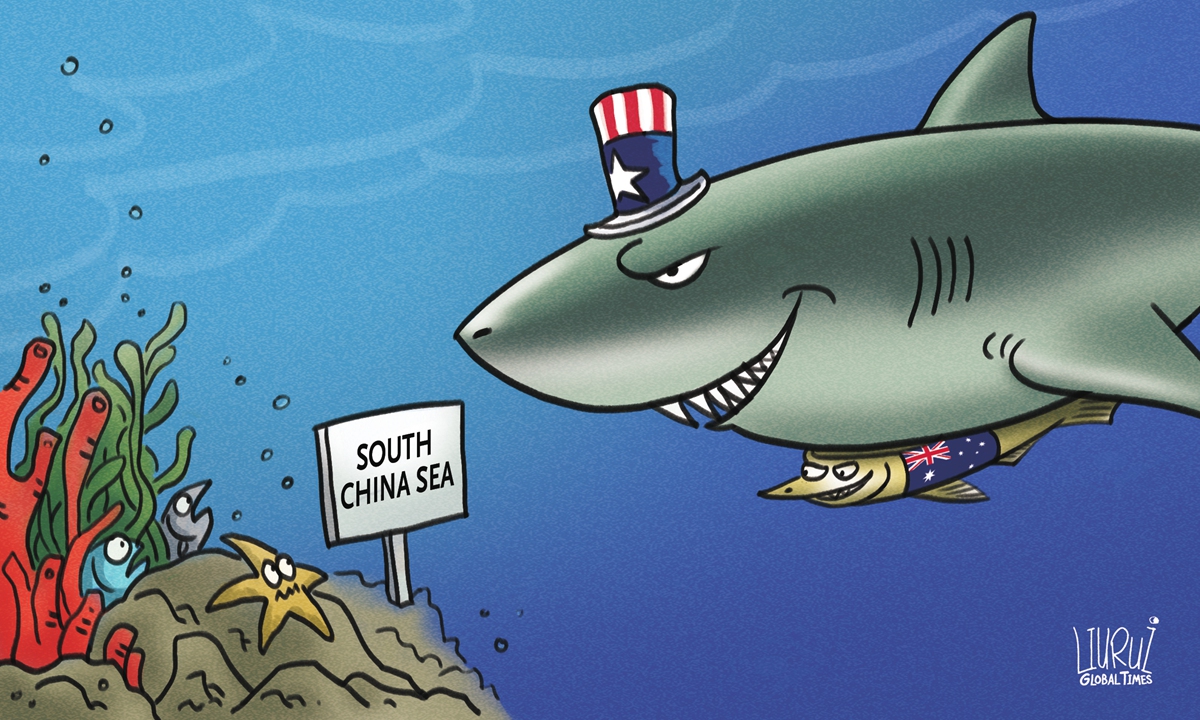Aussies hitch wagon with the Pompeo-Esper express
Source: Global Times Published: 2020/7/28 21:23:40

Illustration: Liu Rui/GT
US Secretary of State Mike Pompeo and Secretary of Defense Mark Esper on Monday and Tuesday met Australian Foreign Minister Marise Payne and Defense Minister Linda Reynolds. They co-hosted the 2020 Australia-US Ministerial (AUSMIN) consultations in Washington DC.
When tensions between China and the US have been escalating, the US is containing on China on all fronts. As one of US' most close allies, Australia's recent moves against China are consistent with the US.
Not surprisingly, the two sides focused on how to confront and contain China. The two countries released a joint statement full of China-related topics such as Hong Kong, Xinjiang, Taiwan and South China Sea.
Australia has long maintained its neutrality with respect to territorial disputes in the South China Sea. But Australia recently changed its tone in the disputed waters. For example, Australia said China's claims in South China Sea are "invalid", and are not in line with the UN convention on the law of the sea.
When bilateral ties between China and the US step into a seemingly "new cold war," Australia, the US' little brother, has to abandon its neutrality in the South China Sea and side with the US.
Australia and the US will expand the number and scale of their military drills in the South China Sea, and maintain their military presence in the region in the long run. The US intends to "establish a US funded commercially operated strategic military fuel reserve in Darwin," an Australian port city, and further pursue "options that enable greater maintenance, repair, overhaul, and upgrade of US military platforms and components in Australia." These actions target China and pose an increasing national security threat to Beijing.
This echoed Pompeo's Thursday address in which he called for the "free world" to change China. Among countries in the so-called free world, Australia is one of the US' most unwavering allies in terms of containing China.
As a matter of fact, Canberra is willing to see Washington launch a "new cold war" against Beijing. This is because Australia can benefit from it. If the US loses its dominance in the Asia-Pacific region, Australia could face greater security challenges. Regional countries that were victims of Australia's aggression and bullying in history may seek to strike back.
For example, Indonesia had territorial disputes with Australia. Without security protection from the US to Australia, Indonesia might become tougher toward Australia.
It is evident that Australia's foreign policy is dependent on the US. Yet Australian government officials and scholars of international relations underline its diplomatic independence. For example, when talking about the support of the so-called freedom of navigation in the South China Sea on Thursday, Australian Prime Minister Scott Morrison said that all government policy was the result of "our own actions, our own initiatives and our own statement." This is only diplomatic rhetoric.
Every country has its own interests which contributes to somehow independence when dealing with foreign relations. But the pillar of Australia's diplomacy is to clearly follow the US. This is embodied in the fact that Australia has engaged in almost all wars that the US has launched.
If the Democratic nominee Joe Biden is elected as the next US president and adjusts the China policy of the US, Australia will certainly follow suit. Where China-Australia relations head for will ultimately be determined by the US' relationship with China.
The article was compiled by Global Times reporter Lu Yuanzhi based on an interview with Yu Lei, a chief research fellow at the Research Center for Pacific Island Countries, Liaocheng University. opinion@globaltimes.com.cn
RELATED ARTICLES:
Posted in: VIEWPOINT